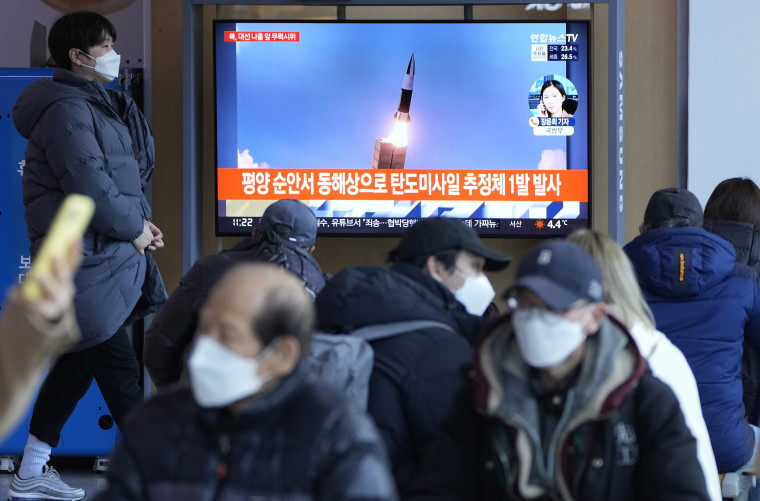U.S. intelligence agencies assess that North Korea’s two recent short-range missile launches were designed to secretly test elements of a new intercontinental ballistic missile system in what a senior administration official called “a serious escalation.”
The two latest North Korean missile tests, on Feb. 26 and March 4, did not draw much attention in the United States because the missiles did not appear to be the kind that can hit North America. The new assessment is significant because North Korea has not test-launched an ICBM since 2017. Doing so is considered even more threatening than a short-range test.
“The United States decided to reveal this information publicly and share it with other allies and partners because we prioritize the reduction of strategic risk and believe firmly that the international community must speak in a united voice to oppose further development of such weapons by the DPRK,” the senior official told reporters Thursday, using an initialism for the Democratic People's Republic of Korea, North Korea's official name.
The official noted that neither of the two recent launches “demonstrated ICBM range or capability,” but he said they were “likely intended to test elements of this new system before the DPRK conducts a launch in full range, which they will potentially attempt to disguise as a space launch. The United States strongly condemns the DPRK for these tests.”
In response, the official said, U.S. forces in the Pacific stepped up surveillance and reconnaissance activities in the Yellow Sea and ordered “enhanced readiness” among missile defense forces in the region.
He said the Treasury Department would be announcing new sanctions Friday, “to help prevent the DPRK from accessing foreign items and technology that enable it to advance prohibited weapons programs.”
“There will be a range of further actions in the coming days,” the official said. “These actions are intended to make clear to the DPRK that these unlawful and destabilizing activities have consequences, that the international community will not accept these actions as normal, and, most importantly, that the only viable path forward for the DPRK is through diplomatic negotiations.”
In a worldwide threats assessment published this week, intelligence analysts said North Korea’s string of missile launches over the last year could presage a return to intercontinental ballistic missile and nuclear bomb tests. That came after NBC News first reported Monday that U.S.-based analysts said commercial satellite imagery shows construction at North Korea’s nuclear testing site for the first time since it was closed in 2018.
The Biden administration has not commented on the new construction, but the official condemned the latest missile launches as “a brazen violation of multiple United Nations Security Council resolutions,” adding that they “needlessly raise tensions and risk destabilizing the security situation in the region. We urge all countries to condemn these violations.”
The official said it wasn’t entirely clear why North Korea sought to disguise the testing of the new missile system, which appears to be a break with its past practice of flaunting its latest weapons.
“Unlike its past tests, the DPRK tried to hide these escalatory steps,” the official later told NBC News. “There could be a range of reasons, including they wanted to hide their continued advancement of their ballistic missile program.”
The Biden administration has offered to talk to North Korean leader Kim Jong Un’s government without preconditions.
“President Biden himself has previously made clear that he is open to meeting with Kim Jong Un when there is a serious agreement on the table, which we need to be based on working level negotiations,” the senior official said. “DPRK continues to not respond.”
In 2018, a South Korean intelligence assessment said North Korea had as many as 60 nuclear weapons, and U.S. officials say they have built many more since. Some U.S. officials believe it already has ballistic missiles capable of delivering a warhead to the United States.
A diplomatic effort by former President Donald Trump, involving two face-to-face summits with Kim, led the North to suspend tests of bombs and ICBMs temporarily but fell apart without an agreement.

